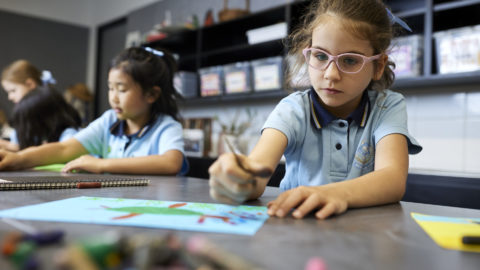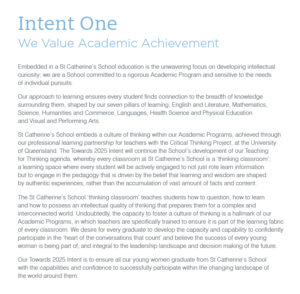Principal Update – Week 3 Term 3

Together with the School Council, I was excited to unveil our new strategic intent, Towards 2025, to our School community last week. We look forward to continuing to lead St Catherine’s through the COVID period and beyond, with this strategy providing a blueprint for the key initiatives that will shape the design and delivery of our educational programs, now and into the years ahead.
 Encompassing Intent One: Academic Achievement is our unwavering commitment to cultivating the ‘thinking classroom’ at St Catherine’s. This key component of the strategy is purposefully shaped by our partnership with the University of Queensland’s Teaching for Thinking program, and is designed to place meaningful learning and intellectual endeavour at the core of all teaching and learning experiences.
Encompassing Intent One: Academic Achievement is our unwavering commitment to cultivating the ‘thinking classroom’ at St Catherine’s. This key component of the strategy is purposefully shaped by our partnership with the University of Queensland’s Teaching for Thinking program, and is designed to place meaningful learning and intellectual endeavour at the core of all teaching and learning experiences.
In our current world of information overload and search engine supplied rapid responses, I believe one of the most important aspects of a modern education is learning to be discerning, learning to think critically and to develop an alternative, informed perspective.
Interestingly, a study conducted by the Bertelsmann Foundation in Michigan in 1998, clearly demonstrated the effectiveness of cultivating deep thinking, as well as measurable learning and retention.
In the study, two groups of 100 social studies students were taught the same information via two different methods. One group was taught the traditional way – podium style lecturing with students sitting in rows. Students poured over worksheets and were repeatedly taught with drills, drills and more drills, along with traditional tests and quizzes.
The second group learned primarily through problem and process-based approaches. These students worked both individually and in groups. They benefited from self-assessment, peer assessment and teacher assessment. They focused on creating real-world products to solve real-world problems.
At the end of the year, both groups were tested using the same traditional state-mandated exams for social studies. The results were stunning and most likely not what you would expect. The scores were almost identical for both groups, regardless of how they learned.
One year later, unwarned and therefore unprepared, the same two test groups were given the very same test from the previous year, when both groups had performed equally well. The results were astonishing. The group taught using traditional methods was able to recall only about 15 per cent of the content; of note, an analysis of the results and students’ thinking indicated they viewed social studies as a series of itemised facts; for example, reciting events that occurred on particular dates, without one influencing or connecting to the other in any way. This provides an excellent example of lower-order thinking and simple content memorisation.
The group taught using problem and process-based learning approaches recalled more than 70 percent of the content. More importantly, they demonstrated a deep understanding of the integrated nature of their learning. In other words, they not only remembered the content, but also understood its significance. They were able to make abstract connections between events.
Effective learners make connections between their existing knowledge and new information.
This research, whilst undertaken some time ago, remains valid today. It sheds light on the need to focus energies on crafting curriculum that challenges teachers and students to do more than rote learn facts and regurgitate for assessment.
At St Catherine’s our desire for a ‘thinking classroom’ requires teachers to:
- resist the temptation to “tell” when teaching;
- avoid teaching decontextualised content, the material needs to be relevant; and
- avoid giving students the final product of our thinking, their thinking is more important.
Below is an example of how cognitive skill development is utilised for a unit of study, in this case we will investigate environmental decision making:
- Identify arguments regarding human nature and our role in the environment.
- Analyse environmental problems, proposed solutions and arguments related to the role of humans in the environment.
- Explain the philosophical basis for decision making in environmental contexts.
- Categorise environmental concerns according to criteria such as valuing life, economic concerns and health issues.
- Evaluate arguments and potential courses of action.
- Justify arguments and positions on environmental issues.
- Conjecture alternative solutions to environmental problems.
At St Catherine’s, our new strategy aims to cultivate the ‘thinking classroom’ and to embrace a learning culture valuing and nurturing deep learning through elevated student engagement, coupled with authenticity in the development of materials used to stimulate discussion.
As a school, we look forward to exciting students with our Thinking Agenda, and to ultimately reduce the passivity of students working to only rote learned content. Greater emphasis on cognitive skills (thinking skills) also plays into the requirements of the new VCE syllabus, tertiary study and for a working life beyond the classroom.
This week, I have been so impressed with our students and the ease of their return from lockdown. Their willingness to follow guidelines such as wearing masks is also noted.
One Day Two Futures
On Wednesday 4 August, St Catherine’s will hold its second annual 24-hour Giving Campaign to change the course of two young futures.
Every gift made to the St Catherine’s Hardship Fund on this day will determine the future of two young lives, by covering the tuition fee for two future students from Years 9 to 12, for families who would otherwise not be able to afford a St Catherine’s education for their daughters.
Like last year, we ask all Old Girls, current parents and grandparents, past parents, past and current staff as well as current students to give – no matter the amount.
Your generosity will assist in providing two future students with an education at St Catherine’s School, just by turning up for this one day of the year.


